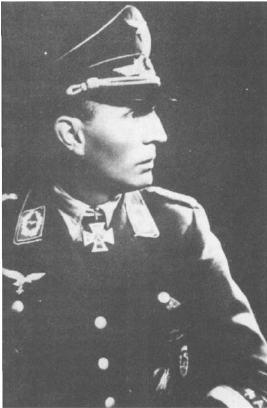
SMASHING T H R O U G H THE CRUST

Lieutenant-Colonel von der Heydte, theCommander of Fallschirmjäger Regiment 6.
As this message was being relayed, MajorKerutt managed to form yet another block-ing position along the southern edge ofAalst. All that was left were the survivors ofthe 1st and 3rd Battalions of the Regimenton Hoffmann, a 20mm anti-aircraft pla-toon, and eleven 75mm anti-tank guns withno tractors. This thin screen was all thatbarred the British from Eindhoven somekm away. SS-Captain Roestel's remainingPanzerjäger IVs were disposed along theflank of the approach from Leende to Val-
kenswaard south of Aalst. At 1020 theKampfgruppe Chill were informed thatarmoured columns were in front of thevillage. Around midday the enemy bumpedthe position. Distinctive crack-and-clunksrang out, as armour-piercing shells toreinto the leading armoured cars and Sher-mans. Clouds of black smoke belched sky-ward, indicating the limit of the advance.Taking evasive action, following squadronsof tanks bypassed the blocking position.Kerutt's battalion withdrew, still fighting,but forced over on to the eastern side of thecorridor. Once again, because of the lack oftow vehicles, the anti-tank guns and manyof their crews were left behind.The road to Eindhoven was now wideopen. It fell in any case in the late afternoonof 18 September to American airborneforces. By 1900 the first tanks from theGuards Armoured Division drove on to itscobbled streets amidst the cheers of wavingcivilians. In the northern suburbs of Eind-hoven two 88mm guns attempted to blockthe passage of the 2nd Battalion 506 Para-chute Infantry Regiment from 101 Division.Kampfgruppe Koeppel of 18 Flak Brigadetelephoned a running commentary of thelast moments of the city's defence:
'Enemy has penetrated into the northof Eindhoven. Street fighting. Furthercontact with unit not now possible;the insertion of infantryreinforcements has been ruled out.Anti-tank group "Grunewald"requests further orders from Army. . . [the telephone message was cutoff].'
9
First Fallschirmjäger Army had now beensplit in two.
89